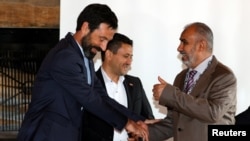Yemeni government and Ansar Allah Houthi representatives have agreed to immediately release 1,081 conflict-related detainees and prisoners. The agreement was reached at the conclusion of 10 days of U.N.-mediated talks in the Swiss city of Glion.
This agreement, when implemented, will be the largest prisoner release between Yemen’s warring parties since they signed a pact to swap some 15,000 prisoners and detainees in Stockholm in 2018.
The U.N. special envoy for Yemen, Martin Griffiths, urges the parties to move forward immediately with the prisoner exchange and spare no effort in building upon this momentum to swiftly agree to releasing more detainees.
“Releasing those detainees will bring immense relief and comfort to more than 1,000 families who will be reunited with their loved ones because of your acts and your decisions. It will bring reassurance and hope to many more families still awaiting the release of their loved ones and their friends," he said.
So far, the warring parties have released only a few hundred prisoners. In unilateral moves, the Houthis last year freed 290 prisoners and Saudi Arabia 128.
The United Nations calls Yemen the world’s worst humanitarian disaster.
The fighting involves the Iranian-backed Houthi rebels who control Sanaa, the capital, and much of the country's north, and a U.S.-backed, Saudi-led coalition fighting on behalf of the internationally recognized government.
Since Saudi Arabia entered the war in support of the government in 2015, the U.N. reports more than 10,000 civilians have been killed and wounded, mainly due to airstrikes, while more than 85,000 have lost their lives due to disease or hunger. The U.N. also says another 3.6 million have been displaced and 24 million need international aid.
The International Committee of the Red Cross, which co-sponsored the talks, calls the agreement signed Sunday a very positive first step. The ICRC regional director for the near- and Middle East, Fabrizio Carboni, says his agency as a neutral intermediary is happy to use its expertise and experience to facilitate the release and repatriation of detainees.
“But we call on all parties to continue with the same urgency towards agreeing on phasing of legs, as well as required security and logistical guarantees for this operation to move from signature to reality," he said.
The U.N. and Red Cross, co-sponsors of this meeting, say they hope the talks will send a message that much can be accomplished when parties to a conflict are willing to compromise and show good faith. They urge the warring parties to build on this important achievement to move together toward a negotiated solution for lasting peace.




